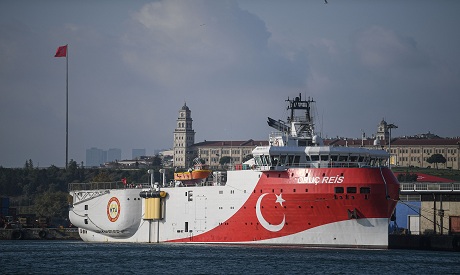
This file photo taken on August 23, 2019 in Istanbul shows a view of Turkish General Directorate of Mineral research and Exploration's (MTA) Oruc Reis seismic research vessel docked at Haydarpasa port, which searches for hydrocarbon, oil, natural gas and coal reserves at sea. - Turkish President Recep Tayyip Erdogan vowed on August 21, 2020, to step up the search for energy in the Mediterranean by the end of the year, despite tensions with Greece and the rest of the EU. Greece on August 11, demanded that Turkey withdraw a research ship at the heart of their growing dispute over maritime rights and warned it would defend its sovereignty, calling for an emergency meeting of EU foreign ministers to resolve the crisis. (Photo: AFP)
Turkey said on Sunday that its Oruc Reis exploration vessel will now carry out seismic surveys in a disputed part of the eastern Mediterranean until Aug. 27, in a move likely to stoke tensions in the region.
Turkey and Greece, NATO allies, vehemently disagree over claims to hydrocarbon resources in the area based on conflicting views on the extent of their continental shelves in waters dotted with mostly Greek islands.
Earlier this month, Turkey said the Oruc Reis would conduct seismic exploration until Aug. 23 in waters claimed by Greece, Cyprus and Turkey. Athens has called the survey illegal.
On Sunday, the Turkish navy issued a new advisory saying that the work of the Oruc Reis and two other vessels, the Ataman and Cengiz Han, would continue until Aug. 27.
Seismic surveys are part of preparatory work for potential hydrocarbon exploration. Turkey and Greece are also at odds over issues such as overflights in the Aegean Sea and the ethnically divided island of Cyprus.
Turkey has also been exploring for hydrocarbon resources in the Black Sea. On Friday, President Tayyip Erdogan announced the discovery of a 320 billion cubic metre (11.3 trillion cubic feet) gas field, the largest such find in Turkish history.
Short link: